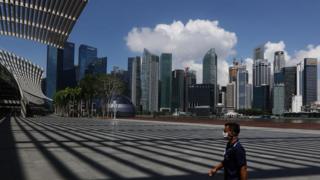Coronavirus: Asia’s ‘shining star’ suffers biggest ever slump
 Image copyright
Image copyright
Getty Images
Singapore’s economy plunged into recession in the last quarter as an extended lockdown hit businesses and retail spending.
Economic growth in the city state shrank by 41.2% compared to the previous quarter, the country’s biggest contraction on record.
Authorities forecast it will be Singapore’s worst recession since independence from Malaysia in 1965.
The figures reveal the severity of the virus-driven downturn faced globally.
Official data showed Singapore’s second quarter gross domestic product (GDP) shrank 12.6% on a year-on-year basis.
As one of first countries to release growth data for the period in which many economies were in lockdown, the numbers from Singapore provide a glimpse of how the ongoing pandemic could affect economies around the world.
The worse-than-expected figures followed a first quarter year-on-year GDP fall of 2.2% and quarter-on-quarter drop of 10.6%.
The deepening downturn also indicates that the pandemic may have impacted Singapore’s economy harder than many of its Asian counterparts.
The slump in global trade has hit the country’s export-reliant manufacturers, while the construction industry activity stalled and retailers have seen sales fall at a record pace.
In contrast Japan’s GDP is seen shrinking by around 20% in the second quarter from the previous three months, while data this week may show that the Chinese economy has now returned to growth.
The data out of Singapore puts more pressure on the country’s ruling People’s Action Party, which last week saw its weakest general election performance since independence 55 years ago.
The government has already pledged about $67bn (£53bn), or nearly 20% of Singapore’s GDP, in stimulus measures to support struggling businesses and households.
Singapore started to ease its lockdown measures, known as the Circuit Breaker locally, on 1 June.
The city state entered phase two of reopening its economy on 19 June, which allows most shops and restaurants to resume business although social distancing rules remain in place.




.jpeg?width=682&height=455&name=AdobeStock_295048993%20(1).jpeg)

